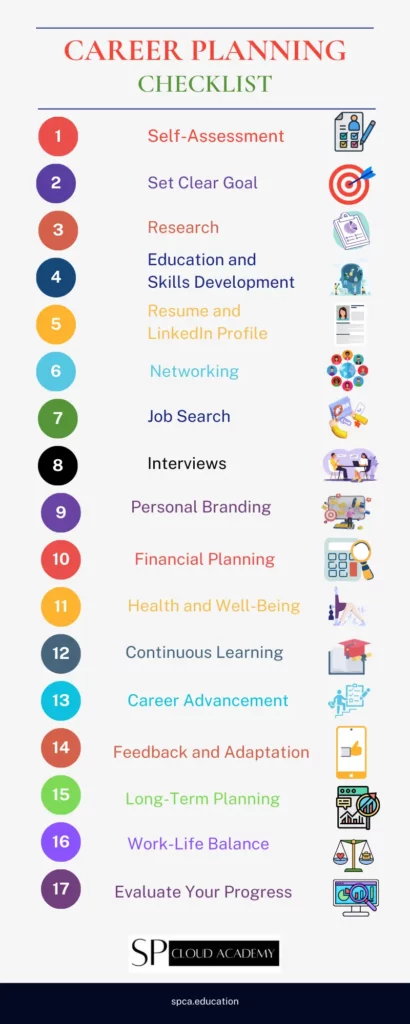Career planning is a structured process that involves assessing one’s skills, interests, and aspirations to set clear and achievable career goals. It requires researching potential career paths, acquiring necessary qualifications or skills, and networking with professionals in the chosen field. Effective career planning includes continuous self-improvement and adaptability to changing job markets. It also involves creating a strong online presence through platforms like LinkedIn, building a well-crafted resume, and preparing for interviews. Additionally, financial planning and work-life balance considerations are essential for long-term career success and satisfaction. Regularly evaluating and adjusting your career plan as circumstances evolve is crucial to staying on course and maximizing your career potential. Career planning empowers individuals to make informed decisions, pursue fulfilling opportunities, and work towards their professional goals.
Importance
Career planning is of paramount importance in today’s dynamic and competitive job market. It serves as a strategic roadmap for individuals to navigate their professional journeys effectively. Firstly, it provides clarity of purpose by helping individuals set concrete career goals based on their skills, interests, and values. This clarity enables them to make informed decisions about their educational and professional paths, ensuring they invest their time and resources wisely.
Secondly, career planning promotes continuous learning and skill development. It encourages individuals to acquire the necessary qualifications and competencies to excel in their chosen fields, making them more marketable and adaptable to changing industry trends.
Furthermore, career planning enhances job satisfaction and overall well-being. When individuals align their careers with their passions and values, they are more likely to find fulfillment in their work, leading to greater life satisfaction.
Lastly, it contributes to long-term financial security by guiding individuals in making strategic decisions about income, savings, and investments.
In summary, career planning empowers individuals to take control of their professional lives, maximize their potential, and pursue careers that align with their aspirations, ultimately leading to personal and financial success.
Developing an Effective Career Plan
Creating an effective career plan involves several key steps. Begin with self-assessment to identify your skills, strengths, interests, and values. Next, set clear, specific, and achievable career goals, both short-term and long-term. Research your chosen field thoroughly to understand its requirements and opportunities.
Once you have a clear direction, develop a step-by-step action plan outlining the necessary milestones, deadlines, and resources needed to reach your goals. Continuously update your plan as you gain experience and as your priorities evolve.
Networking and seeking guidance from mentors or career counselors can provide valuable insights and support. Lastly, maintain flexibility, as unexpected opportunities and challenges can arise. Regularly assess your progress and make adjustments as needed. A well-crafted career plan serves as a roadmap, guiding your professional journey and increasing your chances of success and fulfillment.
Career planning checklist
Creating a career planning checklist can be a helpful way to organize and track your career goals and progress. Here’s a comprehensive checklist to get you started on your career planning journey:
1. Self-Assessment:
- Identify your strengths, weaknesses, skills, and interests.
- Reflect on your values, passions, and long-term career goals.
- Consider your personal and professional values.
2. Set Clear Goals:
- Define your short-term and long-term career goals.
- Make sure your goals are specific, measurable, achievable, relevant, and time-bound (SMART).
3. Research:
- Research different career options and industries.
- Explore the job market to understand current and future trends.
- Network with professionals in your desired field.
4. Education and Skills Development:
- Determine if you need additional education or training.
- Identify relevant certifications or courses.
- Create a plan to acquire the necessary skills and knowledge.
5. Resume and LinkedIn Profile:
- Update your resume with your latest accomplishments and skills.
- Optimize your LinkedIn profile to showcase your professional brand.
6. Networking:
- Attend industry events, conferences, and meetups.
- Connect with professionals on LinkedIn.
- Build relationships with mentors and peers.
7. Job Search:
- Create a list of target companies and organizations.
- Tailor your resume and cover letter for each job application.
- Set up job alerts on job search websites.
8. Interviews:
- Practice interview questions and responses.
- Prepare for common interview formats (phone, video, in-person).
- Research the company and the role you’re applying for.
9. Personal Branding:
- Establish an online presence through blogging or social media.
- Create a personal website or portfolio to showcase your work.
- Monitor and manage your online reputation.
10. Financial Planning:
- Create a budget to manage your finances during a job search or career transition.
- Consider the financial implications of your career decisions.
11. Health and Well-Being:
- Maintain a healthy work-life balance.
- Prioritize self-care and stress management.
- Seek support when needed.
12. Continuous Learning:
- Stay updated on industry trends and developments.
- Attend workshops, webinars, and seminars.
- Seek opportunities for ongoing professional development.
13. Career Advancement:
- Set regular check-ins to review your career progress.
- Seek out promotions or advancement opportunities within your current organization.
- Consider lateral moves or job rotations to gain new experiences.
14. Feedback and Adaptation:
- Solicit feedback from mentors, peers, and supervisors.
- Be open to making adjustments to your career plan as needed.
- Learn from setbacks and failures.
15. Long-Term Planning:
- Consider your retirement and long-term financial goals.
- Plan for career milestones and transitions as you progress.
16. Work-Life Balance:
- Assess and adjust your work-life balance periodically.
- Prioritize your well-being and happiness in your career choices.
17. Evaluate Your Progress:
- Regularly assess your progress towards your career goals.
- Adjust your plan as necessary based on your experiences and evolving aspirations.
Remember that career planning is an ongoing process, and it’s important to adapt your checklist to your specific needs and circumstances. Regularly reviewing and updating your career plan will help you st
Career Planning Mentor
Having a career planning mentor can be immensely beneficial in guiding your professional journey. A career planning mentor is typically an experienced individual in your chosen field who offers guidance, support, and insights to help you make informed career decisions and navigate your career path effectively. Here’s how a career planning mentor can assist you:
- Expertise and Insights: A mentor has in-depth knowledge of your industry and can provide valuable insights about job roles, trends, and opportunities you may not be aware of.
- Networking: They can introduce you to important contacts in your field, potentially opening doors to internships, job offers, or collaborations.
- Goal Setting: A mentor can help you define and refine your career goals, ensuring they are realistic and achievable.
- Skill Development: They may offer advice on which skills and qualifications are most valuable in your industry, helping you prioritize your learning and development efforts.
- Resume Review: A mentor can review your resume, cover letter, and portfolio, offering feedback to make them more appealing to potential employers.
- Interview Preparation: They can assist you in preparing for interviews by conducting mock interviews, providing constructive feedback, and offering tips on how to impress potential employers.
- Career Advice: They can share their own career experiences and provide guidance on overcoming challenges or making critical decisions.
- Confidence Building: A mentor can boost your self-confidence and motivation, encouraging you to pursue your goals with greater determination.
- Long-Term Planning: They can help you create a long-term career plan that aligns with your aspirations and values.
To find a career planning mentor, consider networking within your industry, reaching out to professors or professionals in your field, or joining mentorship programs or organizations. Building a strong mentor-mentee relationship can significantly accelerate your career development and provide you with valuable support and insights along the way.
FAQs
Here are some frequently asked questions (FAQs) related to career planning:
- What is career planning?
Career planning is the process of setting and managing your career goals and aspirations. It involves assessing your skills, interests, and values, exploring potential career paths, and developing a strategy to achieve your professional objectives. - Why is career planning important?
Career planning helps you make informed decisions about your career, identify opportunities for growth and advancement, and align your personal and professional goals. It can also enhance job satisfaction and long-term success. - How do I start career planning?
To start career planning, begin by self-assessment. Identify your skills, strengths, weaknesses, interests, and values. Then, research potential career paths that align with your attributes and goals. Finally, create a plan outlining the steps you need to take to achieve your desired career. - What tools can help with career planning?
There are various tools and resources available for career planning, including career assessments, self-assessment quizzes, personality tests, and online career exploration platforms. Additionally, career counselors and mentors can provide valuable guidance. - How can I set realistic career goals?
Setting realistic career goals involves considering your current skills and qualifications, the job market, and your long-term aspirations. Your goals should be specific, measurable, attainable, relevant, and time-bound (SMART). - What is a career path, and how do I choose one?
A career path is the sequence of jobs and positions you follow to progress in your chosen field. To choose a career path, consider your interests, strengths, and long-term goals. Research different industries and job roles to find a path that aligns with your aspirations. - How can I improve my skills for my chosen career?
You can improve your skills through formal education, online courses, workshops, on-the-job training, and self-study. Networking with professionals in your field and seeking mentorship can also help you develop relevant skills. - Is it too late to change careers?
It’s never too late to change careers. Many people switch careers multiple times in their lives. Assess your transferable skills, gain new qualifications if necessary, and gradually transition into your desired field. - Should I seek professional career advice?
Professional career advice, such as guidance from career counselors or coaches, can be highly beneficial. They can provide insights, assessments, and strategies to help you make informed career decisions. - How can I stay motivated and focused on my career goals?
To stay motivated, break your long-term goals into smaller, manageable steps. Set deadlines, track your progress, and celebrate your achievements along the way. Surround yourself with a supportive network and stay open to adapting your goals as needed. - What are some common career planning mistakes to avoid?
Common career planning mistakes include not conducting thorough self-assessment, neglecting to research potential careers, setting unrealistic goals, and failing to adapt to changing circumstances. It’s important to be flexible and continuously assess and adjust your plan. - How often should I review and update my career plan?
It’s a good practice to review and update your career plan annually or whenever significant changes occur in your life or career. Regularly assess your progress and adjust your goals and strategies as needed.
Remember that career planning is a dynamic process that evolves over time. It’s essential to stay adaptable and open to new opportunities as you work towards your professional aspirations.
See also
Career Guidelines Archives – SP Cloud Academy (spca.education)




